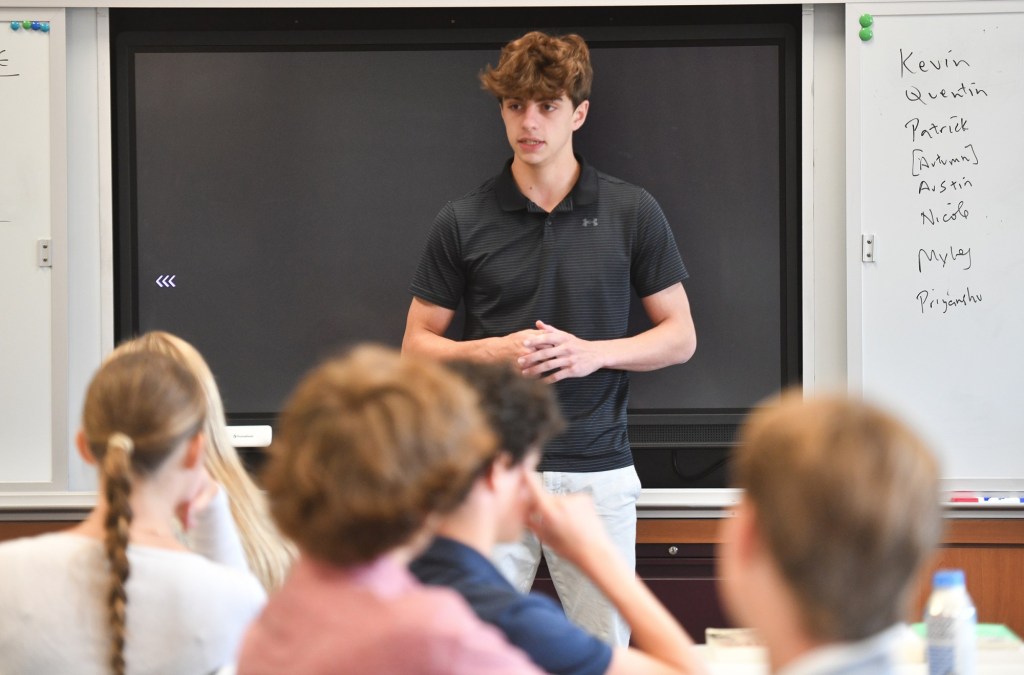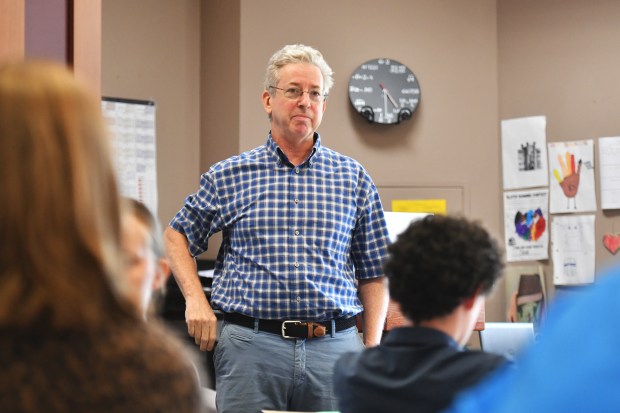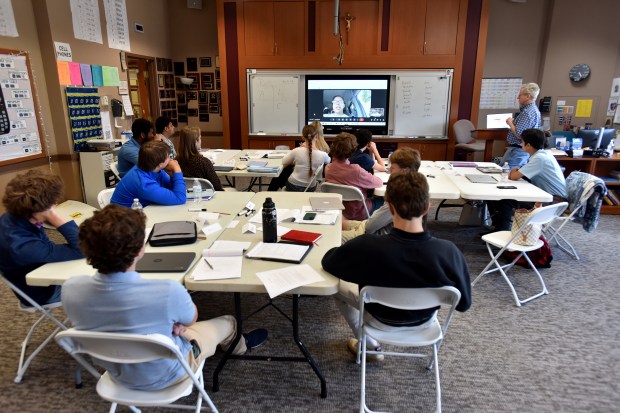SCRANTON — From equipping more people from diverse populations with the skills and resources to launch their own companies to providing books to schools in a poverty-stricken country and implementing a system to address the growing homelessness issue in big cities, Scranton Prep students pitched business plans to their advisers and peers Wednesday as part of the newly introduced Entrepreneurs for Good program.
The two-week summer program – which concludes Friday – aims to prepare students to become successful entrepreneurs while maintaining the school’s Jesuit values of building community, serving God by serving others, and valuing each person’s uniqueness.
Fifteen students selected to participate in the first session of the program receive instruction on the fundamentals of business planning, leadership, marketing, communication and ethics – all while remaining focused on service and social responsibility.
Robert Sprung, a 1980 Scranton Prep graduate and a Harvard and Cambridge-educated entrepreneur, developed the program and brought it to Scranton Prep after implementing it at Phillips Academy Andover in Massachusetts for three years.
Another Prep alumnus, Deborah Zajkowski, and Mike Barker, an employee of the Harvard-Westlake School in California – who are both well versed in entrepreneurship – have been assisting Sprung with the instruction.
The sincerity of the students stood out to Sprung during the first eight days of the program.
“They really do want to make a difference in the world and I think entrepreneurship, today, is a vehicle to do that,” he said. “When I was a student, we didn’t talk about becoming an entrepreneur – it was more of an oddball thing to do – but today it’s very mainstream.”
Their sense of ingenuity also impressed Sprung as the participants developed their ideas into concrete plans.
“With 15 kids, not one of their ideas is about artificial intelligence or crypto, or something trendy like that,” he said. “One of the first things we teach them about the essence of entrepreneurship is being a contrarian. In general, if you’re an entrepreneur, if the herd is running one way you instinctually try to run the other way. I found it very refreshing that their ideas were very real, practical and relevant.”
During his presentation, Anthony De Los Santos – a senior from Dickson City – laid out a plan to help more Latin Americans own their own companies through his proposed firm – InnovaLatino.
Seeing how hard his grandfather worked to establish Bucktown Diner in Dunmore inspired De Los Santos to focus his attention on increasing the number of Latin American business owners.
“He’s been a successful Latin American entrepreneur for less than 10 years because he spent most of his life working under bigger corporations without knowing the freedom of being an entrepreneur,” De Los Santos said. “Like him, 38.2 million Latin Americans work in the United States, but only 10% own their own businesses. At my company, we plan to increase that percentage using a three-step cycle: we plan to build, elevate and launch successful Latin American entrepreneurs. We’ll build the foundation through our entrepreneurial program; we will elevate the entrepreneurs knowledge of their business using our mentorship program and we’ll launch those entrepreneurs into the real world using an investment opportunity network where entrepreneurs take their data and pitches, put it into our data network and investors pay a small finders fee to contact our talent. By doing this, we plan to create an economic snowball of small businesses and generational wealth for the community.”
De Los Santos found many aspects of the program enlightening.
“I learned a lot, especially about finance,” he said. “I love math and numbers, and they laid down the tracks for finance in a way I can understand, which really had an effect on me.”
Anna Brown – a senior from Honesdale – who strives to pursue a career in international relations believes the lessons learned through the entrepreneurship program will serve her well in future endeavors.
“I think this has really helped with communicating with people and being able to see things from different perspectives,” she said.
For her business plan, Brown developed a company called Elimu – the Swahili word for education – after a trip to Kenya left an indelible mark on her two years ago.
Specifically, a meeting with a girl named Faith provided the fuel for her passion project – bringing books to children throughout underserved sections of the country.
“One of the shortcomings that stuck in my mind was that the school didn’t have enough books to fill the shelves for its students,” Brown said. “That broke my heart as I was raised on reading books all the time.”
Brown noted the literacy rate where Faith goes to school is 40% – a number she to seeks to elevate through her proposal.
“Access to books means a better standard of living and it means having confidence, knowledge, and connection to the world,” she said. “By growing our funder base, expanding the number of donation locations and partnerships we’ll be able to send books to different focus regions of Kenya. At Elimu, we believe words connect the world and we’re working toward making books accessible for all.”
Austin Burke – a senior from Scranton – developed a plan to address the plight of homelessness in highly populated areas through a firm called Full Circle – an employee-owned company which would employ many former homeless individuals.
“They’ve been through it and they understand the problem,” he said.
Burke’s research discovered New York City spent $4 billion on homelessness issues in 2024 and still saw in increase in the homeless population. Instead of relying on short-term fixes like homeless shelters and soup kitchens, he proposed a three-step approach to attack the issue at its root and also make a profit – identify, assist and employ.
The first step entails reaching out to homeless shelters and soup kitchens to find out who is looking to work, Burke said. The second step helps them with whatever they need to work a full-time job, from a haircut and clean clothes to drug and alcohol counseling, and the third step involves forging relationships with companies like Amazon and UPS, which provide the people with jobs and pay Full Circle an agent fee – nearly half which is reinvested into the assist program, he added.
Burke thought the entire concept of the program provides valuable insights for students.
“I just like the whole idea of it … being able to be an entrepreneur and your own boss, but also knowing you’re doing good and helping people,” he said.
Leah Okimoto, founder of Aaron’s Presents, a Massachusetts-based nonprofit which mentors kids as young as 10 to design and execute social entrepreneurship projects, offered guidance to the Scranton Prep students during a video call Wednesday as they follow their passions in life.
“Try to really reflect and think about what gets you excited,” she said. “You all have something very unique and you have a way of impacting this world that no one else can do.”
Show Caption
1 of 3
Scranton Prep students pay attention to a video call to entrepreneur Leah Okimoto in a class room at Scranton Preparatory School during the Entrepreneurs for Good summer program Wednesday, July 22, 2025. (SEAN MCKEAG / STAFF PHOTOGRAPHER)
Originally Published: July 22, 2025 at 5:03 PM EDT


